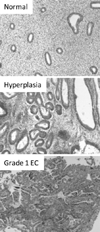Role of progesterone in endometrial cancer
- PMID: 20104432
- PMCID: PMC4767501
- DOI: 10.1055/s-0029-1242998
Role of progesterone in endometrial cancer
Abstract
Progesterone is a key hormone in the endometrium that opposes estrogen-driven growth. Insufficient progesterone will result in unopposed estrogen action that could lead to the development of endometrial hyperplasia and adenocarcinoma. Although these endometrial neoplasias can regress in response to progestin treatment, this does not occur in all instances. To understand this resistance to progesterone and to improve on existing hormonal therapies, it is imperative that the molecular mechanisms of progesterone action through its receptor be deciphered in endometrial cancer. This review highlights what is known thus far regarding the efficacy of progestin therapy in the clinic and the role of progesterone in endometrial cancer cell behavior and gene regulation.
Figures


References
-
- Kurita T, Nakamura H. Embryology and Anatomy of the Uterus. 2nd. Newark, NJ: Harwood Academic; 2007.
-
- Clarke CL, Sutherland RL. Progestin regulation of cellular proliferation. Endocr Rev. 1990;11(2):266–301. - PubMed
-
- Dockery P, Li TC, Rogers AW, Cooke ID, Lenton EA. The ultrastructure of the glandular epithelium in the timed endometrial biopsy. Hum Reprod. 1988;3(7):826–834. - PubMed
-
- Wynn RM. Ultrastructural development of the human decidua. Am J Obstet Gynecol. 1974;118(5):652–670. - PubMed
-
- Gellersen B, Brosens J. Cyclic AMP and progesterone receptor cross-talk in human endometrium: a decidualizing affair. J Endocrinol. 2003;178(3):357–372. - PubMed

